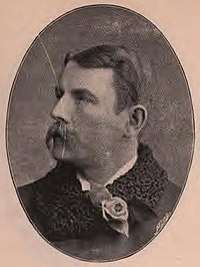Horatio Davies

Lieutenant Colonel Sir Horatio David Davies KCMG (1842–1912) was a London businessman, politician, magistrate and a driving force behind the establishment of Pimms as an international brandname.
Early life
Son of H. D. Davies Esq, he was educated as a poor scholar at Edward Alleyn's original 'College of God’s Gift in Dulwich', founded in 1619.[1] The school was always known colloquially as 'Dulwich College', and the original buildings where Davies was taught are now The Old College and Almshouses in Dulwich Village.[2]
Alleyn's charitable foundation was renamed Alleyn's College of God's Gift in 1857 (when Davies was aged around 15), and was split into Upper and Lower schools. The Upper School moved into new premises in 1870 (formally becoming Dulwich College in 1882), with the Lower School remaining in the old buildings until 1887 when it moved into its new (and current) premises, becoming Alleyn's School.[3]
Horatio maintained that, as a small boy, he had seen the bones of the founder of Dulwich College, Edward Alleyn, when his tomb was moved.[4]
Career
Horatio went on to become a Lieutenant Colonel in the 3rd Middlesex Artillery Volunteers. His career was both of a political and business nature. He was said to have been in his enterprises loyal to his old friends but he disliked the intrusion of newcomers.[5]
Businessman
In the early 1870s Horatio Davies took interests with his wife’s brother, Frederick Gordon, in businessman’s restaurants. They started with the 'London Tavern' and 'Pimm’s Oyster Bar'. 'Crosby Hall' and the 'Holborn Restaurant' followed with much success. Following these ventures, Gordon went on to found the Gordon Hotels Group.[6] Horatio was also noted as owning the 'Ship and Turtle' in Leadenhall Street.[5] He later sold Crosby Hall - one of the City's most ancient buildings, which had previously been saved a number of times from destruction, and it was later pulled down for an office block (the remains were salvaged and re-erected in Chelsea).[5]
Pimms
James Pimm had invented the Pimms beverage as an aid to digesting the oysters his business was selling. After Pimm sold his business to Sir Horatio Davies, the brand was expanded as Horatio started the process of bottling the 'Number One Cup' for other establishments to sell.[7] He also expanded the chain to five Pimm's restaurants.[8] Gradually, an export business was built up, so that by the time of Sir Horatio's death in 1912, Pimm's cocktail was known internationally, especially in the British Empire.[7]
Politics
Horatio was actively involved in law and politics. He was an Alderman of Bishopsgate Ward in London and he became the Sheriff of London and Middlesex in 1887 and Lord Mayor of London in 1897. His old school in the form of the Dulwich College Rifle Volunteer Corps (a forerunner of the present day CCF), took part in his Lord Mayor's Show in 1897.[4]
He was also MP for Rochester from July to December 1892 and for Chatham from 1895 to 1906 as a member of the Conservative Party. In 1898 he was also a Magistrate for Kent and one of Her Majesty's Lieutenants for London.[9] As a magistrate he was regarded as just, but severe to wrong-doers, while tender-hearted for cases of distress.[10] He was made an Officer of the Legion of Honour.[11] He was knighted as a Knight Commander of the Order of St Michael and St George (KCMG) in 1898.
Personal life
In 1867 he married Lizzie, the sister of his business partner Frederick Gordon (and the daughter of Charles John Gordon).[9] After her death in 1907 he married Pauline Marie Boniface in 1909.[11] He was a member of both the Carlton Club and the Junior Carlton Club.[11]
References
- ↑ Hodges, S, (1981). God's Gift: A Living History of Dulwich College. London: Heinemann, pp. 3–5.
- ↑ Picture at Dulwich Deanery.org
- ↑ Darby, W. (1966). Dulwich Discovered. Dulwich: William Darby. p. 32.
- 1 2 Hodges, S. (1981). God's Gift: A Living History of Dulwich College. London: Heinemann, p. 244.
- 1 2 3 Bernard Ash, (1964). The Golden City: London Between the Fires, 1666-1941. Phoenix House. p. 172.
- ↑ Elaine Denby, (1998). Grand Hotels: Reality & Illusion. Reaktion Books. p. 241.
- 1 2 Adrian Room, (1992). Corporate Eponymy: A Biographical Dictionary of the Persons Behind the Names of Major American, British, European and Asian Businesses. McFarland & Co. p. 193.
- ↑ JD Weatherspoon Archived 29 June 2007 at the Wayback Machine.
- 1 2 Walford's County Families of the United Kingdom or Royal Manual of the Titled and Untitled Aristocracy of England, Wales, Scotland, and Ireland (1909). London: Chatto and Windus. p. 291.
- ↑ Mellors, Robert (1914). Old Nottingham suburbs: then and now.
- 1 2 3 Who was Who Volume II: 1916-1928, page 134, A&C Black
External links
- Hansard 1803–2005: contributions in Parliament by Horatio Davies
| Parliament of the United Kingdom | ||
|---|---|---|
| Preceded by Edward Knatchbull-Hugessen |
Member of Parliament for Rochester 1892 – 1893 |
Succeeded by The Viscount Cranborne |
| Preceded by Lewis Vivian Loyd |
Member of Parliament for Chatham 1895 – 1906 |
Succeeded by John Hagan Jenkins |
| Civic offices | ||
| Preceded by Sir George Faudel-Phillips, Bt |
Lord Mayor of London 1897 – 1898 |
Succeeded by Sir John Voce Moore |